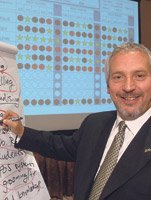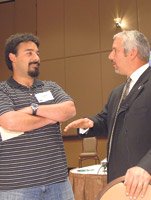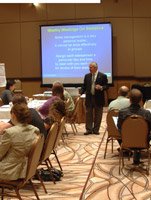Basic Training
Retail consultancy sends managers to ’camp’
When the Wynn Resort Group was preparing to open its latest luxury hotel and casino in Las Vegas, it hired retail consultancy Friedman Group to train the new resort’s retail managers.
Canadian snowsports retailer The Source is on Friedman’s list of regulars. So is Torrance, Calif.–based Diane’s Beachwear. “I put all my people through the program, the district managers, the director of stores,” said Diane Biggs, owner of the 14-store chain.
Friedman, the Culver City, Calif.–based consultancy, has been training retailers ranging from Neiman Marcus to Christian Dior over the course of its 26-year history.
According to the company, retailers have seen their average sales increase anywhere from 5 percent to 20 percent after implementing Friedman’s system.
The company’s success is largely due to its charismatic owner, Harry Friedman, and his no-nonsense method of training retail managers and salespeople.
Drawing on his experience in sales and as a business owner, Friedman has developed a management training system that allows retailers to track the effectiveness of salespeople on the floor and a way of holding each salesperson accountable for his or her actions.
If that sounds dry, it’s only because the explanation is missing Friedman’s irreverent sense of humor.
According to Friedman, retailers fall into a few general levels of effectiveness.
“The non-aware retailers put people on the floor, pay them an hourly wage and hope they sell a bunch. That’s level 1,” he said.
“Level 2 is the guy who has some concept that people want to make money. So he puts in an incentive program and he pays a commission. But retailers don’t have expectations for sales production. They say, ’Here’s what you have to sell this week or this month to keep your job.’ ”
But the problem with that strategy, Friedman said, is that it does not give salespeople the skills to succeed nor the tools to measure their progress. Which leads him to one of many Friedman mantras:
“How people behave on the floor is related to how they are managed—not how they’re paid.”
Friedman’s system
Friedman Group started as a retail consultancy—and the company still provides on-site training and consulting—but for many retail owners and managers, an introduction to Friedman Group is through its seminar series.
The company hosts three-day workshop-style seminars across the country. Its training program is available around the world through its international licensees.
A typical introduction to the company is its “Retail Management Training Camp,” which covers such topics as how to set and reach sales goals, how to motivate and coach salespeople, and how to avoid employee turnover.
The company also offers an advanced version of the training camp, as well as a “Multiple Store Supervision Camp” that’s geared to companies with more than one location.
But for the retailer truly interested in implementing Friedman Group’s methods, there’s “Project Gold Star”—a four-month intensive training program designed to help retailers implement Friedman Group’s Gold Star system in their stores.
The Gold Star system is performance-tracking that can be used to gauge the effectiveness of the staff at one store or can be tailored for an entire retail chain.
The system provides easy-to-evaluate metrics that track an individual employee’s performance in comparison with the store or chain average. The system tracks the employee’s average sales, items per sale and transactions per hour.
The programs are designed to allow the retailer to tailor them to his or her specific business. The system can be customized to track information specific to that retailer.
For example, an electronics company might sell service warranties. Managers or store owners can determine what is the most effective (and profitable) goal for each store. The system also allows the manager to see in which area an employee needs to improve.
The statistics—or metrics—are the first step, however, and don’t take the place of training. The metrics give a manager an idea of where to begin in making improvements on the sales floor.
As an example, Friedman offered the formalwear rental business. Although that retailer might sell tuxedos and gowns, the bulk of its business is in rentals, and add-on sales of items such as handkerchiefs and shoes are key.
By studying the sales statistics, Friedman said, you can determine whether the employee is making enough add-on sales and, if not, the manager can then watch the employee on the floor to determine what he or she is doing wrong.
“Is she asking about add-ons? Is she showing the wrong add-ons or showing them at inappropriate times?” he said. “Those are behaviors, and they require that you have weekly coaching meetings with the sales staff.”
Friedman Group also offers many of its programs in book, DVD and CD form, as well as the on-site training in the entire range of its offerings, from sales and customer service to management and operations.
The system in action
At the management camps, seminar leaders work on ways to improve employee performance, from showing how to read the metrics to how to coach employees to improve in key areas.
At a recent sales training camp in Las Vegas, about 50 managers from across the United States and Canada, including Los Angeles–based Adventure 16 and Siany, Hartman Jewelers in Warrenton, Va., and Canadian cooperative United Farmers of Alberta, gathered to see Friedman in action.
“What would you do if your store manager opened the store late three days in a row,” Friedman asked Dave Beddome, owner of The Source, a three-store snow and skate chain in Calgary, Canada, that carries apparel by companies such as RVCA, Volcom, Billabong, L*Space, Lucy Love, Salinas and WE.
“He’s probably out snowboarding,” Friedman joked, before pointing out that most retailers lose more money by not selling suggested add-on merchandise than they would by opening 15 minutes late.
This is Beddome’s fifth time at a Friedman Group seminar, but the retailer has most of the company’s systems in place, he said, adding that he typically brings along several managers. This time, Beddome was there with several managers in tow, including his buyer, Stacey Burke. The Source staff was spread out around a table, laptops open, notebooks out, and leafing through the giant. Friedman Group course manual handed out at the beginning of the workshop.
Friedman was in complete control of the crowd, peppering the seminar with amusing anecdotes. In one, he described selling suits using what he calls “the nine-point frumph,” a multi-step process of straightening and adjusting a suit jacket.
“You take a kid and you give him a measuring tape and have him do all thathellip;, they think he’s a tailor,” he said.
But between the jokes, it is clear the crowd is engaged.
When describing how to set and enforce customer service standards, Friedman explained his method. The manager discusses ways an employee can approach a customer to suggest add-on merchandise. The two role-play a typical scenario; then the employee shows the manager three times on the sales floor. The entire process is documented, and the employee signs off on it, to show that he or she understands the process.
“How many of you love this?” Friedman asked the crowd. Most retailers raised their hands. “Does it absolutely drive the standards home?” he continued. People nodded.
“The problem with some of these things is if you don’t quantify it, you don’t believe it,” he said, adding: “By not suggesting an additional item, the salesperson is saying ’no’ for the customer, and I don’t think they have the right to do that.”
At the end of the workshop, Friedman asked the crowd: “How many of you think in the last three days you have changed?”
Everyone in the room raised their hands.
“Well, your staff hasn’t,” he responded. “So, if you think you’ve changed, go back to your store and have a staff meeting and bring the [Friedman course manual] with you.”
Sales history
Friedman has the easygoing manner of a seasoned salesman—which is exactly what he was before he started his consultancy.
“I started Friedman Group in the fall of 1980,” he said. “I thought it would be a good idea because people stink at [selling] and I was really good at it.”
He honed his talents in the imprinted sportswear business in the early ’70s, working for one of the largest suppliers of silk-screen equipment. This was in the days when a customer could walk into a stationery store or a gift shop and have a custom T-shirt or cap made using heat-transfer letters and designs. Eventually, Friedman opened his own chain of imprinted sportswear stores.
“I love the business of retail, and I believe without a shadow of a doubt that the most difficult position is store manager,” Friedman said. “I’d prefer to sell on the floor, where I’m in my full glory. When I had my stores, I sold all the time.”
When he launched Friedman Group, he began holding one-day seminars “as a training card to pull people in,” said Friedman’s executive vice president, Jon Dickens. “Now we do about 16 to 20 seminars per year in the United States and Canada.”
Friedman’s clients range from Betsey Johnson to Columbia Sportswear to Rightmans, a 400-store chain in Canada. Apparel is one of Friedman Group’s top three retail categories, Dickens said, noting that jewelry and furniture sales are the other two. Retail sales in apparel have fluctuated in recent years, but to some extent, Friedman Group has been insulated from the sluggish times.
“We’ve always seen our business as recession-proof, because when the economy does well, retailers have more money to spend [on training],” Dickens said. “And when the economy drops, we find the larger retailers come to us.”
Customer service skills are central to the company’s program. Changes in the retail environment have made customer service an important point of difference for many retailers. “Certainly pricing is key,” Dickens said, “but with the advent of the Internet and big-box stores, how do you make the shopping experience more enjoyable and make the customers come back?”
Naturally, Friedman has an anecdote that illustrates this point.
He was attending the opening of the Wynn Las Vegas in 2005. He was staying in the hotel and was getting ready for the opening-night party when he discovered the hem had come undone on his pants. He called the hotel’s hair salon, where his wife was getting her hair done to ask if she had any tape to repair the hem. When the salon manager heard what Friedman’s wife was looking for, she immediately sent a tailor to their room to repair the hem in time for Friedman and his wife to get to the opening-night festivities.
“Customer service—it’s a surprise, not an expectation,” he said. “It’s more like what I’d really like you to do.”
Sales and service go hand-in-hand, Friedman said. “Good salesmanship is inherently good customer service.”
Inside man
After seven years at contemporary boutique Indigo in Los Angeles’ Brentwood district, Robert Keirstead joined the staff at Friedman Group earlier this year as inside account executive manager and regional sales.
During Keirstead’s tenure at Indigo, the retail shop, which carries such lines as GoldSign, Chip & Pepper and Ted Baker, changed its name from Dungarees in order to avoid confusion with the original Dungarees boutique in Los Angeles’ San Fernando Valley.
After leaving the retail side of the business, Keirstead began to research consultancies in Southern California and discovered Friedman Group.
Keirstead said he went to work for Friedman Group for the opportunity to work with Harry Friedman.
“I met Harry and had the opportunity to look at the program,” he said. “There were so many areas I did not already know. And they would have increased my store’s sales phenomenally—and we were already at 30 percent average increases over a four-year period.
As inside account executive manager, Keirstead manages a team of six account executives, who work with retailers to advise them about upcoming seminars and new products. They also are available to answer any questions their clients have. “If they have a problem,” Keirstead said, “we can steer them to the proper product to get their solution.”
Keirstead also handles customized and private programs for regional accounts.
After years of working with wholesale sales reps in the apparel industry, Keirstead said he hopes to interest that side of the business in Friedman Group’s training program, as well. Keirstead said he sees several applications within the wholesale side of the business for Friedman Group’s programs.
“The system we use in the retail environment would work similarly to make sales reps accountable in a wholesale environment,” he said.
A showroom manager, for example, would be able to track each rep’s sales and know what sales techniques the rep needs to keep working on, he said.
In addition, the sales rep could benefit from Friedman Group’s sales training seminars, he continued.
“They can also train their sales reps how to become better salespeople on a call or in the showroom.”
Wynn’s high expectations
When Keri Frame joined the Wynn Resort Group as director of stores in 2004, she and its vice president of retail, Terri Monsour, already knew of Friedman Group and its programs from their experience at luxury retailer Neiman Marcus.
“The reason we went to Friedman is the established relationship we all had,” said Frame. “He has a great reputation as far as customer service standards and the drive to sell more—which is always the goal of a profitable retailer.”
Frame and Wynn’s retail team oversee nearly all of the resort’s retail boutiques, ranging from a gift shop with Wynn logo merchandise to a couture apparel and accessories store. Currently, Wynn Las Vegas has 33 stores within the luxury resort, Frame said. Of those, 27 are owned and managed by Wynn employees.
“Having 27 owned stores on the property, there needed to be a level of consistency in the way we managed them,” Frame said. “Because the stores are so different—from a drugstore to a Rolex store to a Ferrari store—we wanted the managers and the people in the stores to understand the goals that we were working toward. Otherwise, we could have had 27 stores managed 27 different ways. Our goal was to deliver as great service at Manolo Blahnik as we do at the drugstore.”
Frame and her team initially attended Friedman Group’s management training camps in Los Angeles and then worked with the consultancy to create a customized program designed for Wynn’s broad range of stores.
Its sales associates are trained to act as concierges for the entire resort, recommending other stores as well as the hotel’s restaurants and services. The goal, Frame said, is to have Wynn’s visitors feel welcome wherever they go in the resort.
“We want people to feel very comfortable walking into any of our stores,” she said, noting that salespeople are trained to establish a rapport with customers by starting conversations with “non-commercial openers” such as “Where are you visiting from?” or “What is your favorite part of the resort?”
Sales associates will invite window-shopping hotel visitors to enter the store. Frame said they might walk out of the store and say, “Come on in. I’ve got more beautiful things inside. hellip;
“Everything we do represents Wynn,” she said. “We want to be inviting and engaging and give that great experience no matter what part of the property you’re on.”
The Wynn philosophy is to create a memorable experience that the guests can take with them after they leave. “We have a saying in retail,” Frame said. “People won’t remember what you said, they won’t remember what you did, but they will remember the way you made them feel.”
























